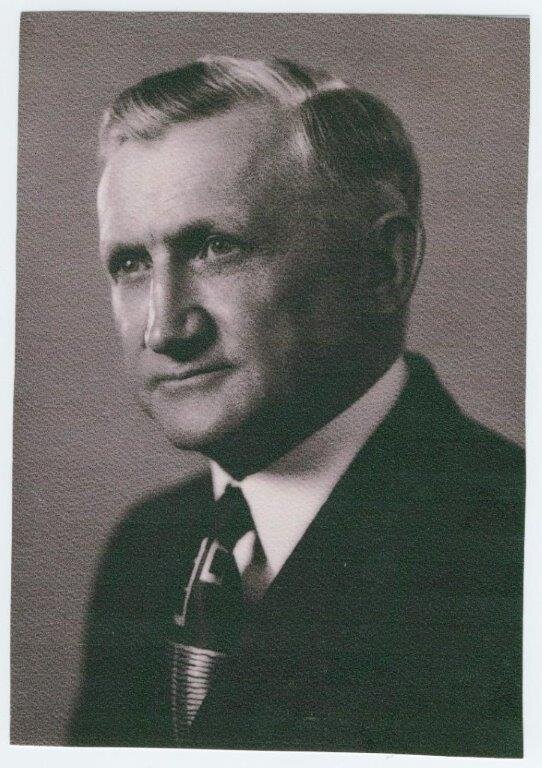Judge Walter J. Lindal
1887-1976
Lawyer/Cultural
Saskatchewan/Winnipeg, MB
Walter Jakobson Lindal was born in northern Iceland April 22, 1887, at Haukagil. His father Jakob Hansson decided to immigrate to Canada and changed his surname to Lindal, abandoning the system whereby the children acquired the first name of the father as surname. Walter was born “Valdimar Jakobson” and this was anglicized to “Walter Jakobson Lindal” to assist, his father claimed, their assimilation in the new land.
The Lindal family immigrated to Canada in 1887. This was the year of the largest migration, and followed years of dire poverty, particularly in the rural areas. The family settled in the district of Thingvalla in Saskatchewan and raised cattle and sheep. They moved to Foxwarren, Manitoba in 1896 to take up grain farming and to Winnipegosis in 1900 to take advantage of a fishing boom. Walter’s health, however, could not take the rigors of fishing summer and winter, so he filed on a homestead (160 acres) near Leslie, Saskatchewan. By working the land in summer months he was able to finance his education.
Walter attended Wesley College in Winnipeg and received his BA degree in 1911. He was awarded scholarships every year which materially assisted him. In his final year he achieved the highest marks made by any student up to that time. He decided to take law, and studied at the University of Saskatchewan, graduating in 1914 with first class honors. He practiced law in Saskatoon until late 1915, then enlisted for war service. He took officers’ training and went overseas with the rank of Captain in the 223rd Battalion. To serve at the front he reverted to the rank of Lieutenant and joined the 27th Battalion, and served with distinction in France and Belgium. He was gassed at Passchendale on November 6, 1917 and was discharged as medically unfit in May 1918, suffering from tuberculosis as a result of injury to his lungs. He was sent to the Ninette Sanatorium where he slowly recovered. To brush up on his law he enrolled at the University of Manitoba and obtained his Manitoba LLB. In 1919 he opened a law practice in Winnipeg, in partnership with his wife.
Lindal married Jorunn Hinrikson in Winnipeg on April 20, 1918. She was the daughter of Magnus and Kristin Hinrikson of Churchbridge, Saskatchewan. Her parents had also immigrated to Canada from Iceland in 1887. .” She and Walter had two children, Anna Ruth Hilland born 1925 and Elizabeth Jo born 1929, who followed her example in social work and teaching respectively.
After becoming established in a law practice, Walter Lindal lectured for five years at the Manitoba Law School on a part-time basis. For twelve years he served on the Board of Governors of United College, now the University of Winnipeg (previously Wesley College). He was appointed a King’s Counsel (KC) in 1932. He was active in politics and served as President of the Manitoba Liberal Association from 1936 to 1942.
In 1941, Lindal wrote his first book, Two Ways of Life: Freedom or Tyranny. The Toronto Globe and Mail’s editor wrote “…no other writer anywhere has equaled Mr. Lindal as an exponent of the principles for which we fight.”
In 1942 Walter Lindal was appointed County Court Judge for the Northern Judicial District of Manitoba. Minnedosa was its judicial centre. He served until his retirement in 1972 age the of 75. During his twenty years on the Bench, only one of his cases was appealed to the Supreme Court, and it was dismissed with the plaintiff required to pay costs. He was the only County Court Judge during these years to have his cases reported in all three Law Reports -- Western Weekly Reports, Manitoba Reports and Dominion Law Reports of Toronto.
In 1942, Judge Lindal was asked by the Department of Labor to preside over a Court of Referees, to hear all Selective Service appeals, and he served in this capacity for twenty-five years.
In 1942 the Department of Labor in Ottawa established an advisory committee on employment at three levels. Judge Lindal was appointed Chairman of the Winnipeg Committee and served from 1942 to 1945. He served on the Prairie Regional Committee from 1945 to 1947, and as Chairman of the National Employment Committee in Ottawa from 1947 to 1960.
During World War II, Judge Lindal became concerned with ways that ethnic groups could make the greatest contribution to development of a sound, united Canada. He worked with the ethnic press, and formed the Canada (Ethnic) Press Club in Winnipeg in 1942. He was instrumental in having the Canada Ethnic Press Federation formed in Toronto in 1958, comprising all ethnic editors in Canada. He was elected the first President and served for three years. He was designated “Founder and Life Past President of the Canada Ethnic Press Foundation.”
In the fall of 1946, Judge Lindal wrote a book entitled Canadian Citizenship and Our Wider Loyalties. He claimed our loyalties had to extend beyond Canada and Great Britain in order to become citizens of the world, and to achieve world peace. The introduction by Rabbi Solomon Frank states that “If the people of Canada succeed in properly correlating their diverse loyalties, they have reason to feel that Canada is providing a pattern which other nations may well follow.”
In the late 1940’s Judge Lindal became active in promoting the development of Canadian citizenship and took a leading part in organizing the “Citizenship Council of Manitoba.” He became its first President, a position he held for three years, and continued as a member of the Advisory Committee.
In the spring of 1947, after years of discussion and preliminary planning and fundraising, a Foundation Committee was set up to further the establishment of a Chair of Icelandic Language and Literature at the University of Manitoba. Judge Lindal was appointed vice-chairman, and he, along with the chairman, Dr. P.H.T. Thorlakson, and many others, worked hundreds of hours in laying the groundwork and raising the necessary funds. Finally in 1951 over $150,000 had been raised primarily from Icelandic Canadian donors. The Chair was established and a professor from Iceland duly appointed.
In 1955, the year of the Golden Jubilee in Saskatchewan, Judge Lindal wrote The Saskatchewan Icelanders: A Strand of the Canadian Fabric. In the book he chronicled not only names, dates and settlements, but also outlined the history of the migrating Icelanders, their thoughts, outstanding traits and characteristics. He did this so as to convey an understanding of the Icelandic people and hence their contribution to the building of “Canadianism” in which the identities of the various ethnic cultures would be preserved. These he refers to as “strands.” He did not ascribe to the “melting pot” theory.
Judge Lindal was also active in various Icelandic and Icelandic Canadian organizations. In 1942 he and a group of Canadians of Icelandic descent organized and published a quarterly called The Icelandic Canadian. It is written in the English language and is still in existence today. It was felt that it filled a need as all other similar publications were in the Icelandic language. Judge Lindal was active in this publication for 23 years and was editor-in-chief for 15 years. He was President of the Icelandic Canadian Club in Winnipeg from 1944 to 1946, and of the Viking Club of Manitoba in 1943.
Judge Lindal frequently contributed articles to magazines and newspapers on a wide range of subjects, often focusing on multi-culturalism. He attended the first public meeting of the Royal Commission on Bilingualism and Biculturalism which was held in Ottawa in November 1963, and was basically responsible for briefs submitted by the Canada Ethnic Press Federation, the Royal Commonwealth Society, Winnipeg Branch, and the Canada (Ethnic) Press Club.
In 1967, Centennial Year, he was commissioned to write The History of the Icelanders of Canada, a book of over 500 pages. He continued the theme begun in his earlier book on Saskatchewan Icelanders, and stressed how certain qualities of mind that Icelanders possess have been strengthened through the adversities they have had to endure, in Iceland and then in Canada as new settlers. Regarding the book, Dr. Richard Beck of the University of North Dakota, wrote “You have written a timely and highly informative work of lasting importance, which does honor to yourself, and for which all your fellow Icelanders in particular, owe you a large debt of gratitude.”
Judge Lindal received many awards and honors over the years, including:
*Town of Minnedosa “Honorary Citizen” award 1962
*City of Winnipeg “Community Service” award 1963
*City of St. Boniface “Honorary Citizen” award 1965
* The Government of Manitoba “Red River Cart”
*Metropolitan Corporation for Greater Winnipeg Award for Journalism
*Golden Boy’s Good Citizen Award, for outstanding citizenship 1969
*Medal of Honour, Manitoba Historical Society Centennial Celebration 1971 for cultural achievement
*Manitoba Bar Association Medallion in recognition of his 50th Anniversary
of the Call to the Bar, 1971
*Honorary Life Membership of the Royal Canadian Legion, Dominion Command, Ottawa, 1971
*Life Membership, Ionic Lodge No. 25, A.F. and A.M. Scottish Rite of
Freemasonry and Khartum Shrine Temple, Winnipeg
*Knight of the Order of the Falcon, Iceland 1962
*Knight Commander, Order of the Falcon, Iceland 1962.
Judge Lindal married Gwen Magnusson in 1950. Her parents also emigrated from Iceland to Lundar, Manitoba. Judge Lindal passed away July 28, 1976, at Colonel Belcher Hospital, Calgary, Alberta, in his 90th year.
Ruth Hilland


